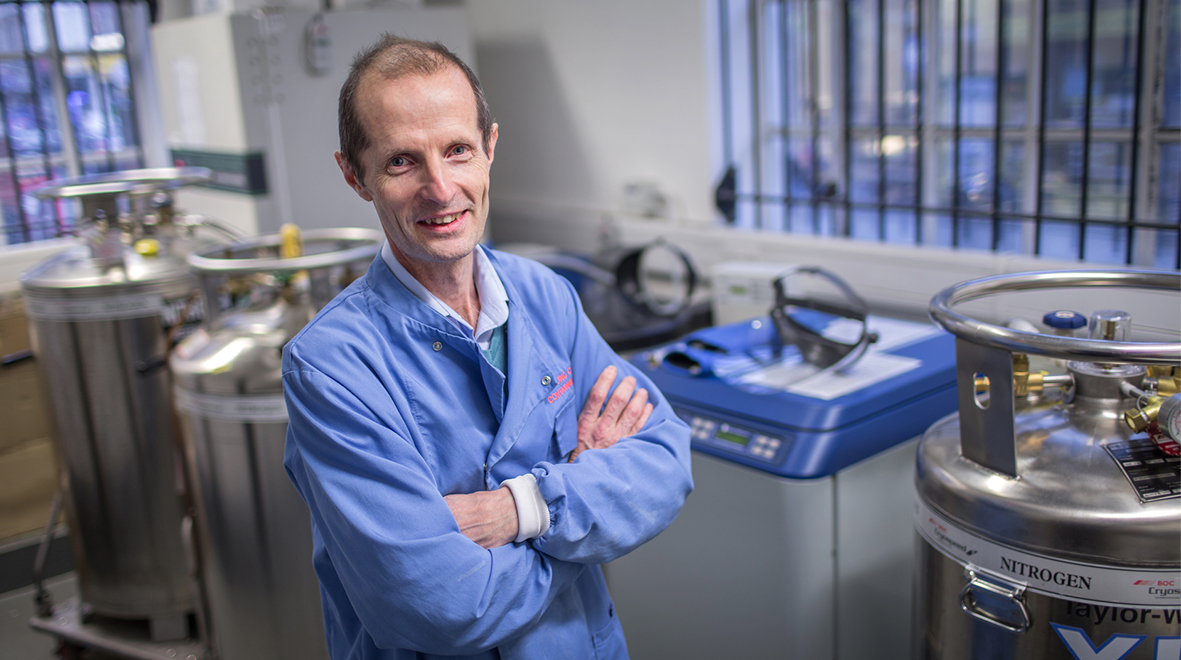To mark World AIDS Day 2017, we have published a series of blog posts to highlight the important and varied research that takes places at Imperial. Three experts from Faculty of Medicine share their interest in HIV/AIDS which spans from the elusive vaccine to the economics of the epidemic.
World AIDS Day takes place annually on 1 December as an opportunity for people worldwide to unite in the fight against HIV and to show support for people living with HIV/AIDS.
Where are we in the battle against HIV/AIDS?
The past thirty years have seen enormous gains. We’ve seen the development of highly effective therapy that today can ensure the health of an HIV positive individual for rest of their natural lifespan. We used to speak of HIV/AIDS as if they were the same thing, now you can be HIV positive and never develop AIDS (Acquired Immunodeficiency Syndrome). Globally over 18 million people are now receiving life-saving drugs, preventing millions of deaths each year. Treatment also dramatically reduces the risk of passing on the infection. Excitingly, recent studies have shown that taking a daily pill (known as pre-exposure prophylaxis or PrEP) can prevent people from contracting HIV infection and this is now being made available in the UK.
However, significant challenges lie ahead
Treatment is for life and is not a cure; we are currently unable to eradicate the virus once someone has been infected. As many as a third of individuals infected with HIV are unaware that they have contracted the virus and late diagnosis significantly impacts on the benefit of available treatments. While great strides have been made to make global treatment accessible, only half of those currently infected are accessing treatment and for every individual starting treatment, one or two people are newly infected. This means that the population requiring life-long medication will continue to expand with associated pressure on global financial resources and already stretched health systems.
So, what is needed to see an end to this epidemic?
Two things would be game changers: an effective vaccine and a cure. I believe the development of an effective HIV vaccine is one of the biggest biological challenges of our time. Why has it been so elusive? The simple answer is that HIV poses a unique challenge. It has multiple strategies to escape the immune system, for example, it mutates very readily, is highly diverse, and camouflages its external proteins in sugars that prevent effective antibody recognition. If that wasn’t challenging enough, it can infect cells and remain silent (or latent) for many years, evading detection by the immune system.
How are we responding to this challenge?
As researchers, we have garnered more knowledge about this virus than any other on the planet. We are using this knowledge to build new vaccine approaches that can target antibodies to squeeze between the sugar-coating of the virus’ external proteins. This requires painstaking research to redesign these proteins at the molecular level and then manufacture them as vaccines. In parallel, we are training immune cells to more effectively recognise and kill infected cells by targeting parts of the virus that it can’t change. This approach combined with a therapeutic drug may help us meet our second goal – an effective cure.
All this work would not be possible without appropriate funding
For me, this means a grant from the EU’s Horizon 2020 programme. This allows me to lead the European AIDS Vaccine Initiative 2020, a €23 million program across 23 institutions. While Brexit brings uncertainty over UK access to future EU funding, one thing that is not uncertain is my commitment and that of my colleagues to continue to work till a successful vaccine is developed and an effective cure is realised.
Professor Robin Shattock is the Head of Mucosal Infection and Immunity within the Department of Medicine.
Read our other World AIDS Day posts:
Professor Mark Bower on HIV-related cancers
Dr Katharina Hauck on the health economics of fighting HIV
Following the launch of the Faculty of Medicine’s reorganised academic structure on 1 August 2019, this post was recategorised to Department of Infectious Disease.
